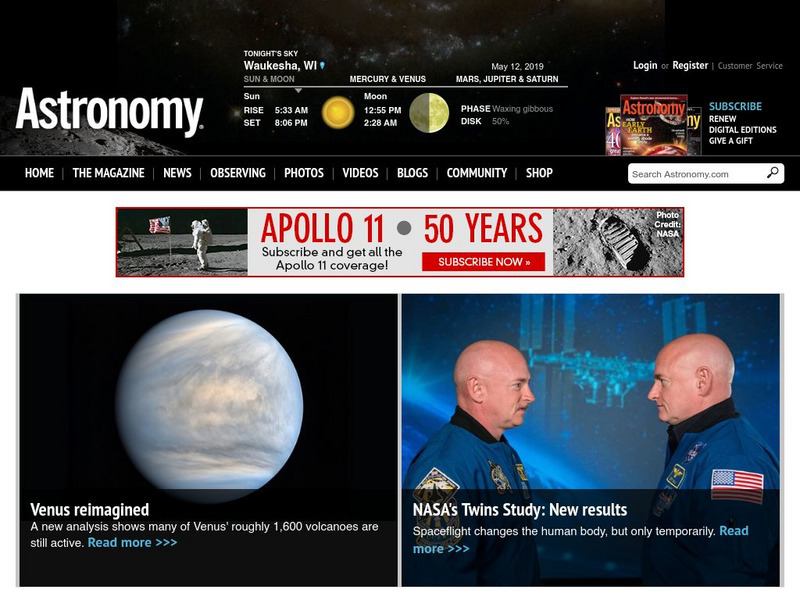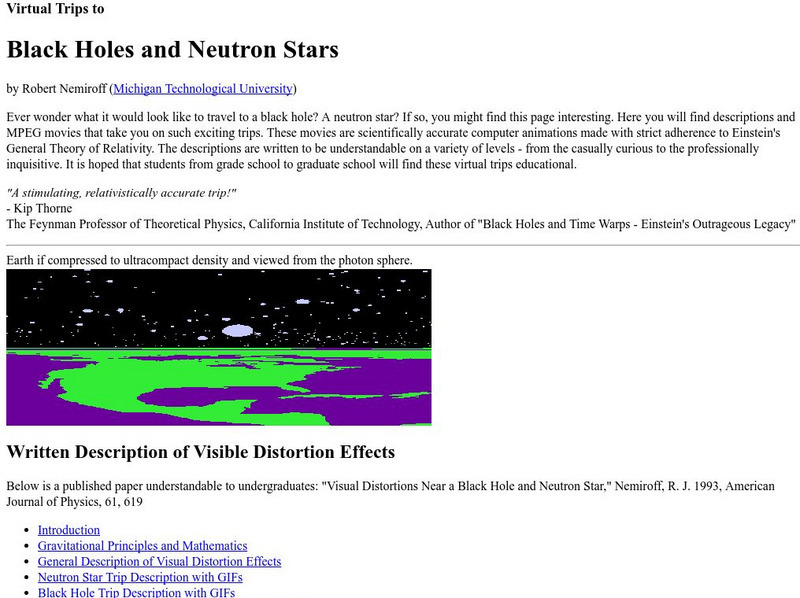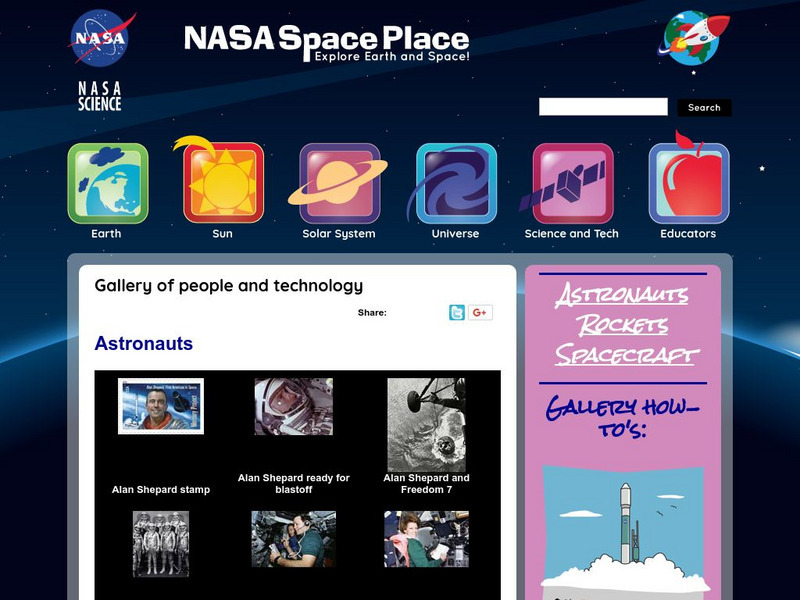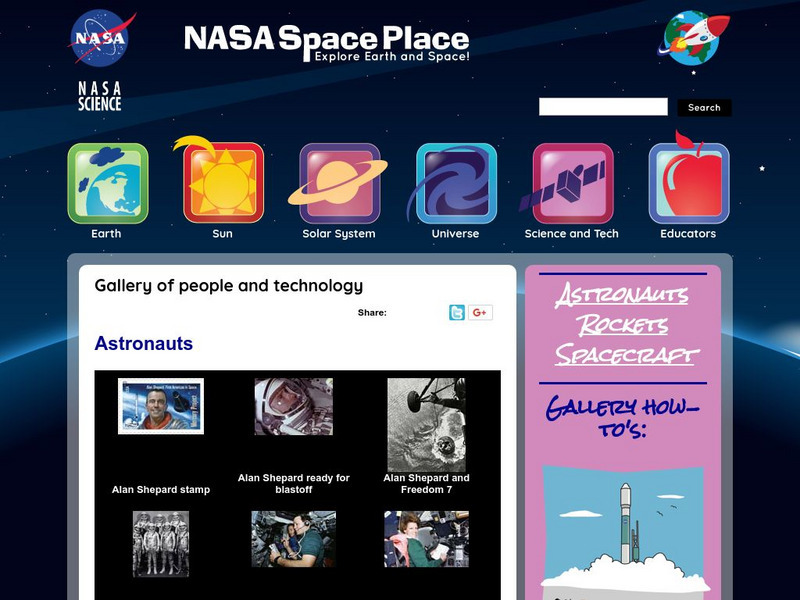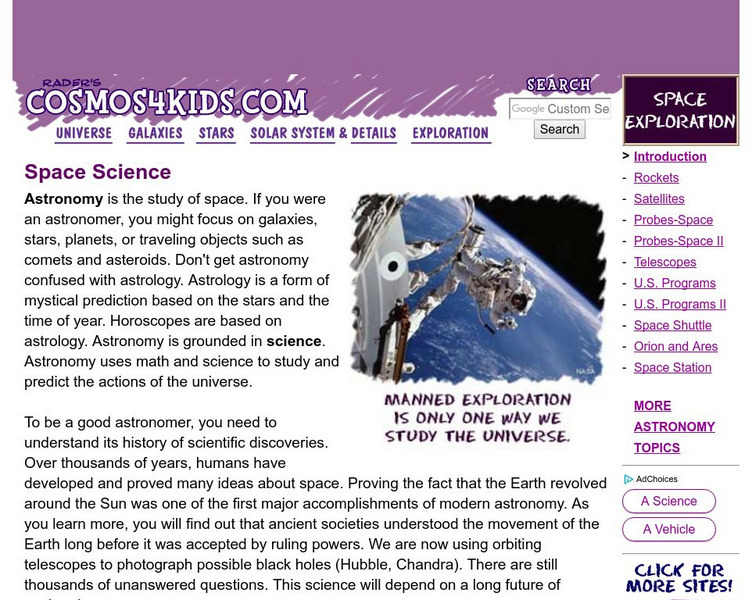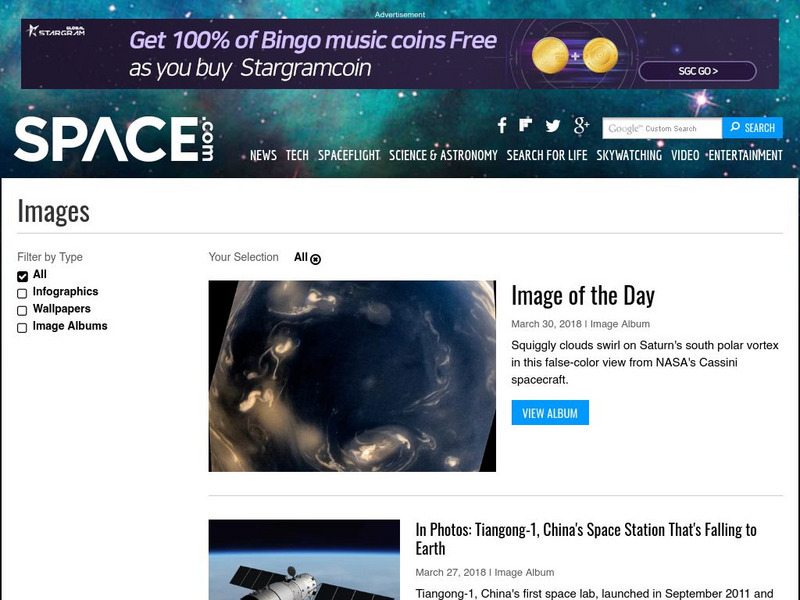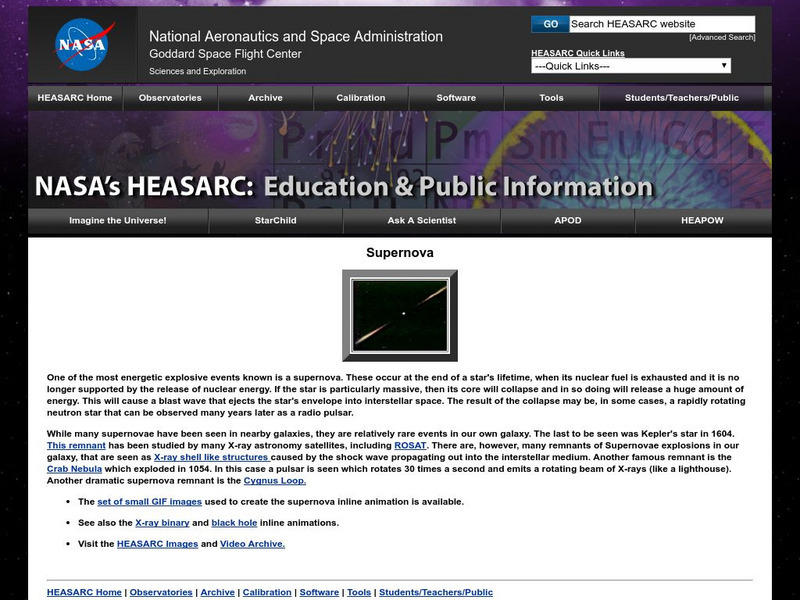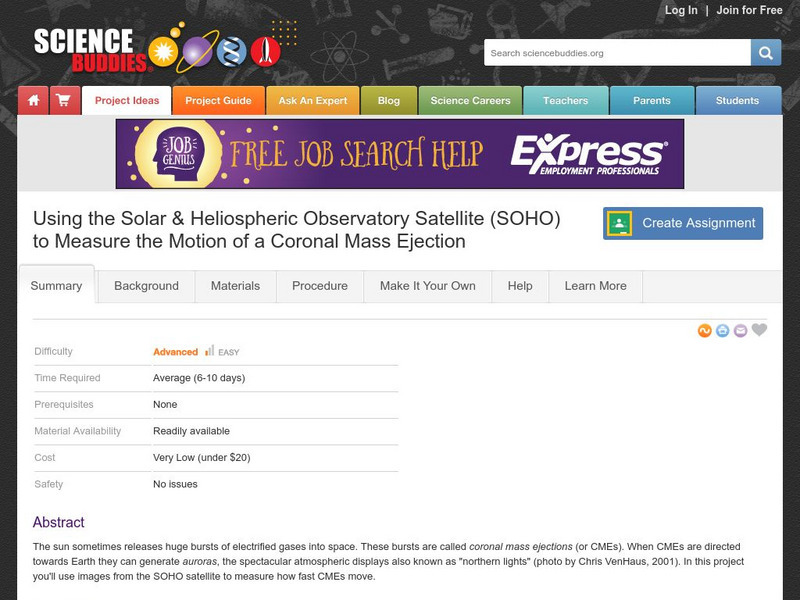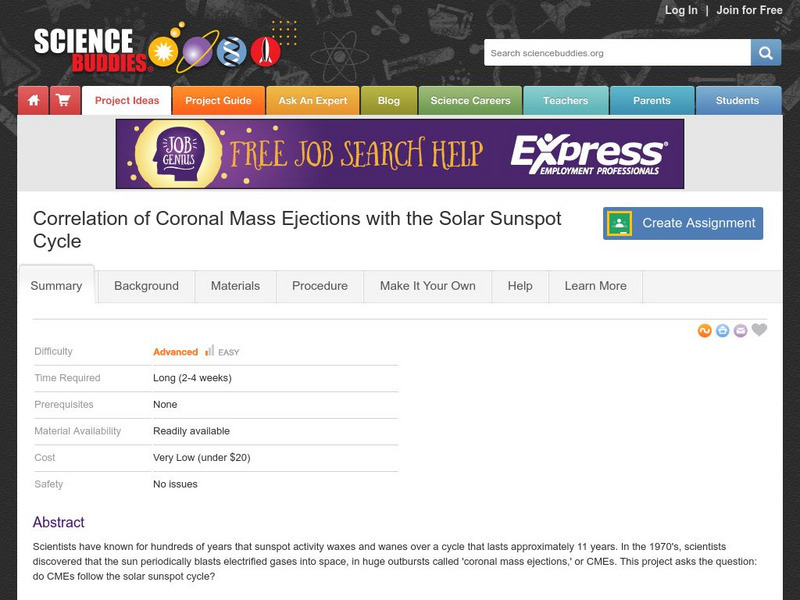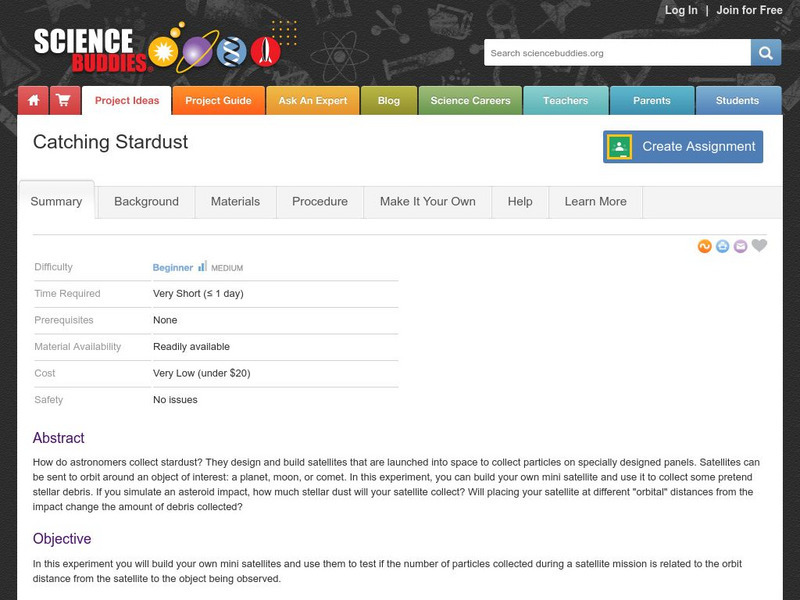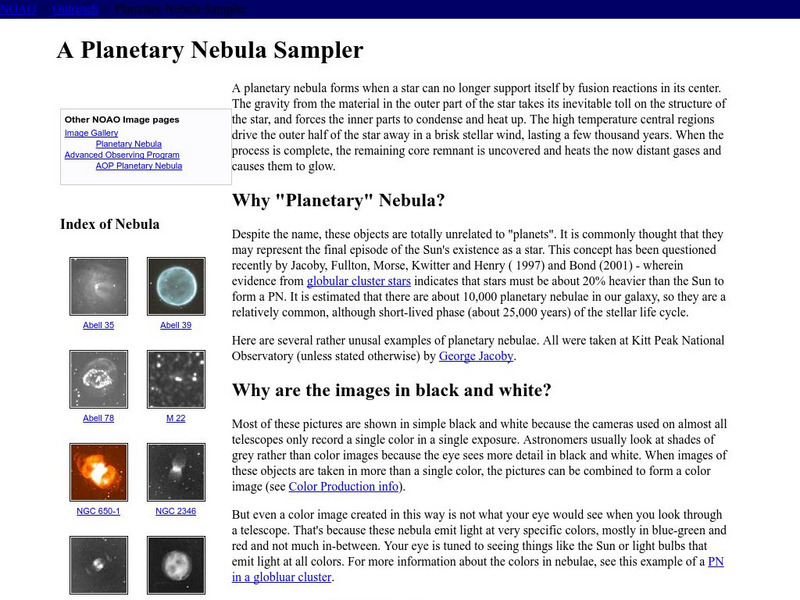Other
Astronomy.com
Astronomy.com offers daily astronomy news, a photo gallery, hobby news, The Sky Online, telescope information, NASA mission guides and much more.
NASA
Nasa: Astronomy Picture of the Day: Virtual Trips to Black Holes. Neutron Stars
Learn more about black holes and neutron stars. View the MPEG video of a virtual trip into a black hole.
Wolfram Research
Wolfram Science World: Science World of Astronomy: Snc Meteorites
View a chart displaying various kinds of meteorites collected on earth and read a technical article describing the manner in which they are studied. Provides a link to more information about the planet Mars and the role it plays in the...
NASA
Nasa: Astronomy Picture of the Day:the Clouds of Neptune
Changes in the atmosphere of Neptune as recorded by the Hubble Space Telescope.
NASA
Nasa Space Science Data Archive: Asteroid 253 Mathilde
This site contains facts about the asteroid 253 Mathilde from the National Space Science Data Center at NASA.
NASA
Nasa: Astronomy Picture of the Day: Gamma Ray Quasar
A photograph and description of quasar 3C279 viewed in gamma-rays. It was unexpectedly discovered and was one of the brightest objects in the gamma-ray sky until it suddenly faded.
NASA
Nasa: The Space Place: Gallery of People and Technology
A whole page of astronaut pictures which you can download and print. Many of the images are labeled with the names of the astronauts portrayed.
NASA
Nasa: The Space Place: Gallery of People and Technology
NASA has provided a whole page full of images for you to download and print. These pictures are labeled and can be enlarged.
Other
Astromador: Astronomia Para Amadores
This resources focuses exclusively on astronomy. It's packed with historical facts about space exploration, famous people who pioneered the study of stars and planets. It features chronological list of space exploration, current news,...
Other
Astronomy: One Degree Imager Debuts at Wiyn Telescope
This article explains the debute of a One Degree Imager at WIYN Telescope at Kitt Peak National Observatory. It discusses what the imager is capable of doing.
Other
Canal Kids: Ciencias (Science for Portuguese Speakers)
Colorful, engagingly written information about astronomy and biology for Portuguese-speaking English language learners. Both subjects are broken down into a broad array of related subtopics. The biology section is particularly helpful...
NASA
Nasa: Kepler: A Search for Habitable Planets: Transit Tracks
Classroom lesson for teaching astronomy uses PowerPoint presentations and illustrations of Kepler's light curves used to discover planets.
Cosmos 4 kids
Cosmos4 kids.com: Exploration
Space can be explored in many different ways. Read about space exploration and click on the topics on the right margin to find out how man finds out about his universe.
NASA
Nasa: Electromagnetic Spectrum: Radio Waves
Radio waves have the longest wavelengths in the electromagnetic spectrum. This NASA article discusses AM, FM, TV, cell phone, as well as radio astronomy, which all use this technology.
Space.com
Space.com: Space Views
Zoom in on everything from distant galaxies to the Earth's most interesting places! See the Pyramids, London, Hoover Dam, and more. Check for bald spots on the heads of the presidents at Mt. Rushmore. See how much the polar ice caps on...
TED Talks
Ted: Ted Ed: How Do We Study the Stars?
Yuan-Sen Ting takes us into deep space to show how astronomers study the stars beyond our reach. [4:46]
Views of the Solar System
Views of the Solar System: The Solar System
Explore the solar system through this site that includes vivid multimedia resources. Learn the latest scientific discoveries, the history of space exploration, and much more. Site includes videos, graphics, articles, and photographs.
Space Telescope Science Institute
Hubble Site: Hubble Monitors Weather
This site is from Hubblesite which is provided by the National Aeronautics and Space Administration. "What's the weather for Mars and Venus? The Hubble telescope has given astronomers a peak." Site provides images, video as well as...
NASA
Nasa: Heasarc: What Are Pulsars?
A detailed definition of a pulsar with an explanation of the relationship of pulsars to X-ray astronomy and links to related resources.
NASA
Heasarc: Supernova
Describes the most energetic explosive event in outer space: the supernova. Includes animation of a supernova.
Science Buddies
Science Buddies: Observatory Satellite Measures Motion of Coronal Mass Ejection
The sun sometimes releases huge bursts of electrified gases into space. These bursts are called coronal mass ejections (or CMEs). When CMEs are directed towards Earth they can generate auroras, the spectacular atmospheric displays also...
Science Buddies
Science Buddies: Correlation of Coronal Mass Ejections With Solar Sunspot Cycle
Scientists have known for hundreds of years that sunspot activity waxes and wanes over a cycle that lasts approximately 11 years. In the 1970's, scientists discovered that the sun periodically blasts electrified gases into space, in huge...
Science Buddies
Science Buddies: Catching Stardust
How do astronomers collect stardust? They design and build satellites that are launched into space to collect particles on specially designed panels. Satellites can be sent to orbit around an object of interest: a planet, moon, or comet....
Other
National Optical Astronomy Observatory: A Planetary Nebula Sampler
A planetary nebula forms when a star can no longer support itself by fusion reactions in its center. This NOAO site is also illustrated.
Other popular searches
- Astronomy and Space Science
- Space Science Astronomy
- Space and Astronomy
- Preschool Astronomy/space
- "Astronomy and Space Science
- Astronomy and Space Lesson
